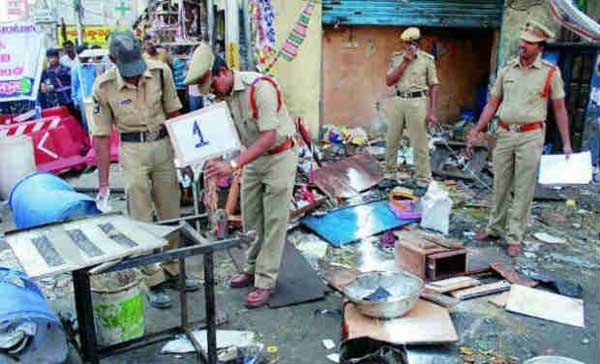For several months, senior operatives of Jamaat-ul-Mujahideen Bangladesh (JMB) quietly slipped into India to visit seven madrasas across three West Bengal border districts to build a robust network before the October 2 Burdwan blast exposed a growing terror plot.
The literature recovered from the Burdwan house also reveals links of JMB to several global terror outfits. There were pamphlets mentioning al Qaeda leader Ayman al-Zawahri and others addressed to “brothers in Chechnya.”
Interrogation reports of two women arrested from Burdwan and related intelligence missives accessed reveal the larger cross-border design to destabilise Bangladesh and short-circuit its bilateral relationship with India. Rumi Bibi and Amina Bibi disclosed key details of senior JMB leaders who had the run of West Bengal for months. The interrogation reports cannot be used as evidence in court but are of immense value to investigators working on the case.
The women said JMB was on a recruitment and fund-raising drive for months. It targeted seven madrasas in Murshidabad, Malda and Nadia districts to recruit a dedicated cadre of at least 150 young men to carry out attacks in Bangladesh. Before the October 2 blast, nearly 50 improvised explosive devices (IEDs) had been dispatched to Dhaka and Assam, the women told interrogators. “We don’t know if the bombs were meant for terror attacks in Assam but Dhaka was definitely a target,” a senior security official confirmed.
The bomb factory was operational for three months with the husbands of the two women travelling regularly to Burrabazar in Kolkata to purchase basic ingredients. The Burdwan module was reporting to a JMB operative identified as Kausar Ali, a Bangladeshi citizen.
“JMB operatives based in Syhlet, Bangladesh, were sending cash through couriers to a doctor in Assam. The doctor would then inform Kausar who sent three recruits by road to Assam to personally collect the cash,” the interrogation report says.
The couriers would take elaborate detours to Berhampore, the district headquarters of Murshidabad, carrying cash consignments going up to Rs. 10 lakh at times. Kausar would also coordinate the delivery of the bombs from various modules to the Indo-Bangladesh border.
The ISI, which worked out of the Pakistan Embassy in Dhaka, provided material and financial support to these outfits working against India.
Indian intelligence agencies – the Intelligence Bureau (IB) and the Research & Analysis Wing (R&AW) – had earlier identified two key JMB leaders, Sohail Mehfooz and Mohammed Bilal, regularly visiting the seven madrasas in India. They were joined by another JMB leader, Mohammed Habibur Rehman, who visited Murshidabad to meet several Indians and start a fund-collection drive.
According to intelligence reports, the details of the fund collection and recruitment from India was finalised at a meeting of the JMB leadership in August 2014 at the Darul-Ulum-Majharul madrasa in Nawabganj, Bangladesh.
The literature recovered from the Burdwan house also reveals links of JMB to several global terror outfits. There were pamphlets mentioning al Qaeda leader Ayman al-Zawahri and others addressed to “brothers in Chechnya.” A DVD supporting the al Qaeda and Chechen rebels was also recovered from the house along with 55 grenades, gelatin sticks, chemicals and five cellphones with 50 SIM cards.
The revelations of the Burdwan module have also put considerable strain on the ongoing counterterrorism cooperation between New Delhi and Dhaka.
“For the last six years Dhaka had proved to be a major ally for us in tracking down key terrorists,” a former R&AW chief told HT. The assistance from Dhaka helped neutralise the United Liberation Front of Asom (ULFA) and several jihadi outfits like the Indian Mujahideen (IM) using Bangladesh as their base of operations.
“At bilateral talks between the Union home secretaries of India and Bangladesh, they would give us a list of 20 people who they believed were being sheltered in West Bengal…”: a senior home ministry official.
The ISI, which worked out of the Pakistan Embassy in Dhaka, provided material and financial support to these outfits working against India. “Some of the plans to target Mumbai on 26/11 was also done out of Bangladesh and we had intercepts of the LeT’s head of operations speaking to a key operative in Bangladesh to plan the attack,” a former senior intelligence official said.
But for various reasons, New Delhi failed to reciprocate the help. “At bilateral talks between the Union home secretaries of India and Bangladesh, they would give us a list of 20 people who they believed were being sheltered in West Bengal. They were criminals and terrorists actively plotting against the government in Bangladesh but the Centre just couldn’t prevail upon the state government to help,” a senior home ministry official said.
Some of the names on the list shared by Bangladesh include JMB leaders who are now believed to be connected to the Burdwan module. “Nearly four years ago they asked us for Shahdat Hossain, a criminal and terrorist operating out of a madrasa in the Lalgola area of Murshidabad in West Bengal. But the state government just refused to cooperate with us,” a foreign ministry official familiar with the home secretary talks said. The same madrasas have now been identified by the two women arrested from Burdwan as targets for the JMB’s fund collection and recruitment drives.
On another occasion, Bangladesh was keen to extradite a suspected terrorist identified as Sohail Mahfuz. The then special secretary for internal security and R&AW chief, KC Verma, sought home minister P Chidambaram’s help to deal with the West Bengal government. But despite repeated efforts, the Union government failed to get the man Bangladesh had asked for. Frustrated with the lack of cooperation from the state, the R&AW chief reportedly told Chidambaram that he could get more done in Bangladesh than the home minister could do in West Bengal.
Courtesy: http://www.hindustantimes.com/





